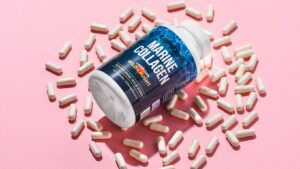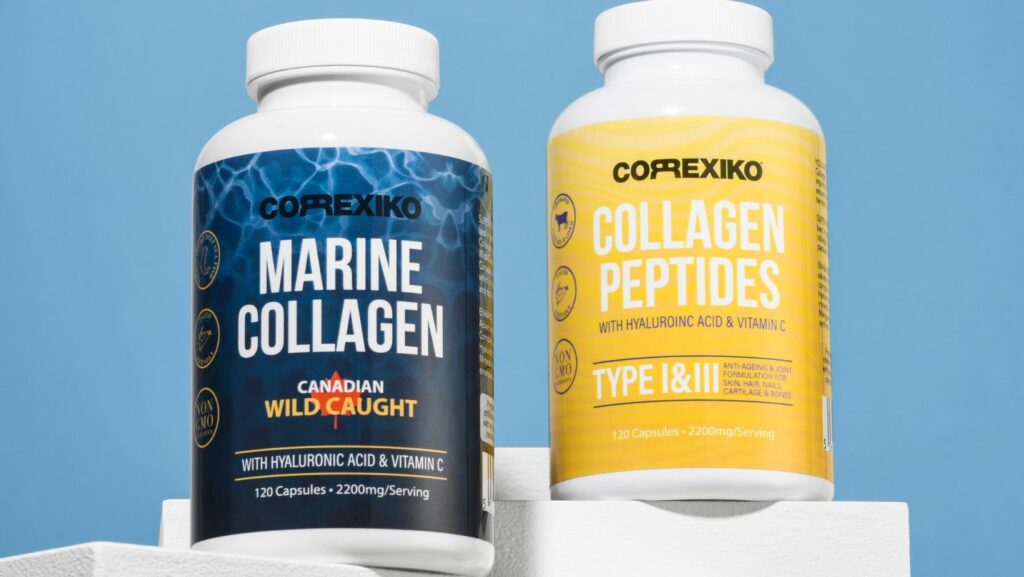Sports Research Collagen Peptides Nutrition Facts
- Collagen Peptides Overview: Collagen peptides are bioactive proteins that support joint health, muscle recovery, and overall athletic performance.
- High-Quality Source: Sports Research collagen peptides offer approximately 20 grams of protein per serving, with a low-fat and low-carbohydrate profile, making it suitable for various diets like keto and paleo.
- Amino Acid Benefits: The primary amino acids—glycine, proline, and hydroxyproline—are vital for muscle repair, cartilage integrity, and collagen stability, essential for athletes.
- Joint Health Improvement: Regular intake of collagen peptides can significantly enhance joint function and reduce pain, facilitating better performance in high-impact sports.
- Muscle Support and Recovery: Collagen peptides can stimulate muscle protein synthesis, supporting muscle growth and reducing soreness, making them beneficial for post-workout recovery.
- Easy Dietary Incorporation: Incorporate collagen peptides into your diet through smoothies, coffee, soups, baked goods, and oatmeal for an effortless nutritional boost.
In the world of sports nutrition, collagen peptides have emerged as a powerful ally for athletes and fitness enthusiasts alike. These small protein fragments are known for their impressive benefits, from supporting joint health to enhancing muscle recovery. As more people discover the potential of collagen peptides, understanding their nutritional profile becomes crucial.
Sports Research collagen peptides stand out in the crowded market, offering a high-quality source of this essential nutrient. Packed with amino acids, these peptides can help improve overall performance and promote better recovery after intense workouts. By exploring the nutrition facts behind Sports Research collagen peptides, individuals can make informed decisions about incorporating this supplement into their routines for optimal health and performance.
Overview of Collagen Peptides
Collagen peptides are bioactive compounds derived from collagen, a protein integral to connective tissues, skin, and bone. These peptides result from the hydrolysis process, which breaks down collagen into smaller, digestible units. The body absorbs these peptides efficiently, making them beneficial for various health aspects, particularly in sports nutrition.
Collagen peptides predominantly consist of amino acids, with glycine, proline, and hydroxyproline being the most abundant. Glycine contributes to muscle repair, while proline helps maintain cartilage integrity. Hydroxyproline plays a crucial role in collagen stability, enhancing overall joint health.
In terms of nutrition facts, a typical serving of collagen peptides provides approximately 20 grams of protein. This amount is significant for athletes seeking to support muscle recovery post-exercise. Collagen peptides are low in fat and carbohydrates, making them suitable for different dietary plans, including keto and paleo diets.
Athletes and fitness enthusiasts increasingly turn to Sports Research collagen peptides for their high quality and effectiveness. This brand ensures a clean formulation with minimal additives, making it a preferred choice for those focusing on enhancing physical performance and recovery. The bioavailability of these peptides allows for quick absorption, facilitating immediate benefits.
Incorporating collagen peptides into a balanced diet can support overall well-being. Athletes may experience improved joint function, reduced muscle soreness, and enhanced skin health. Regular consumption of these peptides contributes to a holistic approach to sports nutrition and recovery.
Nutritional Profile of Sports Research Collagen Peptides
Understanding the nutritional profile of Sports Research collagen peptides reveals essential information for athletes and fitness enthusiasts. The supplement offers a high-quality source of protein while remaining low in fat and carbohydrates.
Protein Content
Sports Research collagen peptides provide approximately 20 grams of protein per serving. This protein content is significant for muscle recovery and support, making it beneficial for athletes post-exercise. The low-fat and low-carbohydrate properties make it adaptable for various dietary preferences, such as low-carb or ketogenic diets. Quick absorption allows the body to utilize these amino acids effectively, supporting overall athletic performance.
Amino Acid Composition
The amino acid composition of Sports Research collagen peptides primarily includes glycine, proline, and hydroxyproline.
- Glycine: This amino acid aids in muscle repair and protein synthesis, which are vital for enhancing recovery.
- Proline: This supports cartilage integrity, playing a crucial role in joint health, particularly for athletes involved in high-impact sports.
- Hydroxyproline: This contributes to collagen stability, essential for maintaining healthy connective tissues.
Overall, the unique combination of these amino acids supports joint function, reduces muscle soreness, and enhances overall health for active individuals.
Benefits of Collagen Peptides for Athletes
Collagen peptides offer numerous advantages for athletes, particularly in areas of joint health and muscle support. Understanding these benefits aids in maximizing performance and recovery.
Joint Health and Recovery
Collagen peptides play a significant role in maintaining joint health. They contribute to the repair and strengthening of cartilage, which cushions joints during physical activity. Studies indicate that collagen supplementation can lead to reduced joint pain for athletes, especially those engaged in high-impact sports. An improvement of up to 30% in joint function has been reported following consistent collagen intake. Furthermore, collagen peptides support overall joint flexibility, allowing athletes to perform at optimal levels without the risk of injury. This benefit is essential for sustaining long-term athletic participation and enhancing recovery after strenuous activities.
Muscle Support and Growth
Collagen peptides assist in muscle support and growth through their rich amino acid profile. The predominant amino acids—glycine, proline, and hydroxyproline—are vital for muscle repair following exercise. Research demonstrates that collagen supplementation can promote an increase in lean muscle mass, particularly in individuals engaged in resistance training. Consuming about 20 grams of collagen peptides post-workout may stimulate muscle protein synthesis, crucial for recovery. Regular intake not only aids in muscle regeneration but also helps mitigate muscle soreness, enabling athletes to train more effectively and frequently.
How to Incorporate Collagen Peptides into Your Diet
Incorporating collagen peptides into a diet is straightforward and can enhance nutrition effectively. Here are some recommended dosages and creative recipe ideas.
Recommended Dosage
A typical recommended dosage of collagen peptides is about 10 to 20 grams per day. This amount effectively supports joint health and muscle recovery. Athletes often take collagen peptides post-workout to maximize muscle repair, while others may opt for doses within this range to promote overall wellness. Consistency in consumption maximizes the benefits; incorporating collagen peptides daily into any routine can yield significant improvements in fitness and recovery.
Recipe Ideas
Incorporating collagen peptides in meals enhances their nutritional value without altering flavor. Here are some ideas:
- Smoothies: Mix 1 to 2 scoops of collagen peptides into fruits, vegetables, and yogurt for a protein-rich boost.
- Coffee: Stir in collagen peptides to hot or iced coffee for added nutrition. It blends seamlessly, providing protein without changing taste.

- Soups and Broths: Add collagen peptides to soups or broths, enriching each serving with protein and promoting joint health.
- Baked Goods: Include collagen peptides in baking recipes by substituting part of the flour. This works well in muffins, pancakes, and brownies.
- Oatmeal: Stir in collagen peptides into hot oatmeal or overnight oats for a nourishing breakfast option.
These simple integrations ensure that collagen peptides contribute needed nutrients while enhancing meal enjoyment.
Make Informed Choices
Collagen peptides are emerging as a vital component in sports nutrition. Their unique nutritional profile makes them an excellent choice for athletes seeking to enhance recovery and joint health. With a significant protein content and minimal fat and carbohydrates, they fit seamlessly into various dietary plans.
Regular consumption of high-quality collagen peptides like those from Sports Research can lead to noticeable improvements in muscle recovery and joint function. By incorporating these peptides into daily routines, athletes can support their performance and overall well-being. Understanding the nutritional benefits of collagen peptides empowers individuals to make informed choices that align with their fitness goals.

